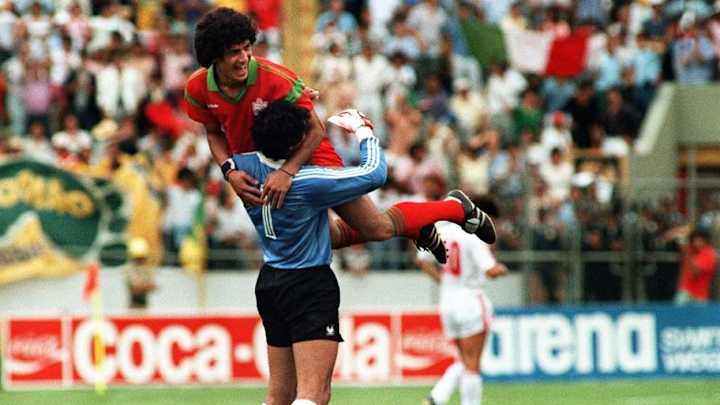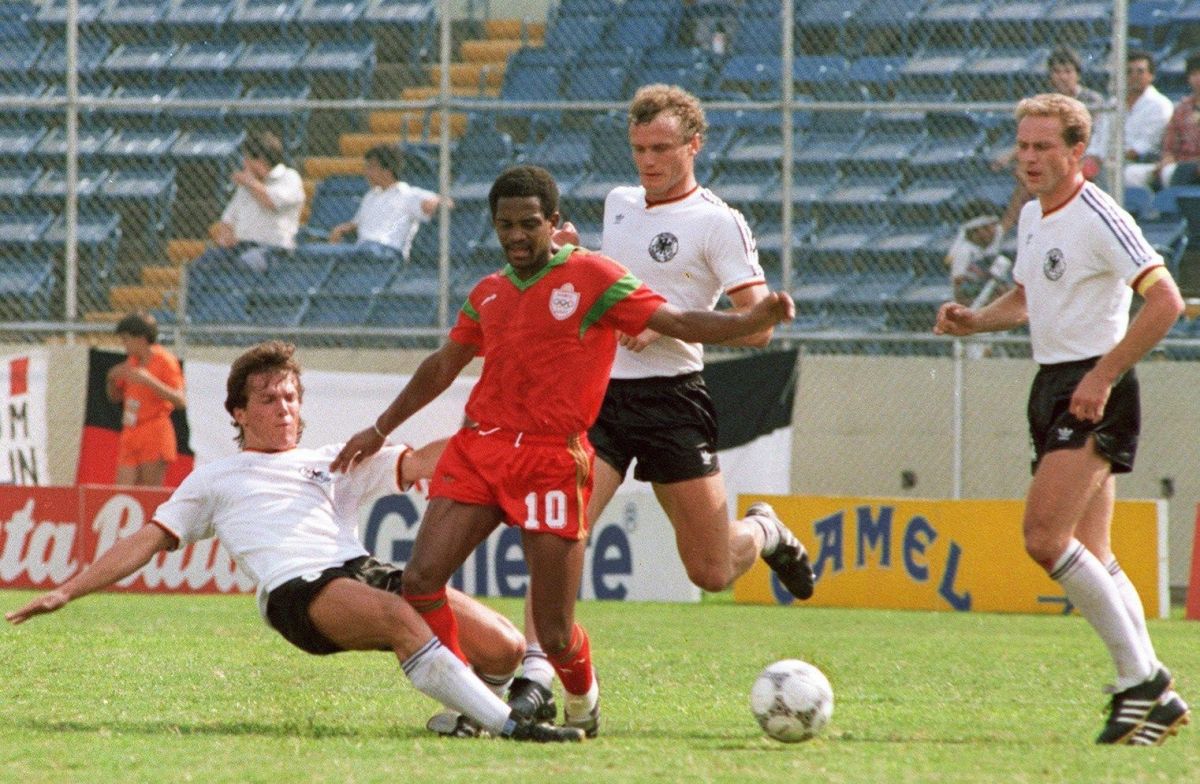World Cup Countdown: 8 Weeks to Go - Morocco Give Africa Their Moment in the Mexican Sun

Africa’s boycott against the allocation of World Cup places in 1966 may have brought about change, but by 1982 the hackles were raised once more. When the tournament was expanded by eight places, half of them were given to Europe, which already had the largest contingent. The other continental groups were given just one extra place each.
The 1982 World Cup did little to improve Afro-European relations. Algeria won two games but were eliminated after West Germany and Austria’s collusion in the Disgrace of Gijón. Africa seethed with a collective sense of injustice, but Algeria had proved that they compete with the very best.
As 1986 rolled around, most of the world still treated African teams as also-rans. When the Group F teams and players were introduced to the media before the tournament, most of the attention was for England, and Poland’s Zbigniew Boniek. Nobody cared about Morocco, who were only there to make up the numbers.
If the Moroccans had one thing going for them, it was preparation. With just five of their squad playing in Europe, they travelled to Mexico over a month before the tournament started, spending 40 days in Monterrey to acclimatise to the conditions.
Undaunted by their underdog status, they believed that their obscurity offered the element of surprise. “We were at an advantage as we knew their players, while they did not know us very well,” said midfielder Mustafa El Haddaoui. “In those times, it was quite difficult to get information about other teams.”
Morocco’s players may have been unknown quantities in Europe, but many were household names in Africa. Mohamed Timoumi was the reigning African Footballer of the Year, a man so important to the team that Morocco’s King Hassan II recruited the best surgeon in the country to ensure he was fit for the tournament.

Timoumi’s midfield partner was Aziz Bouderbala, regularly the man to provide the killer pass for the Merry brothers up front. Mustapha Merry was Morocco’s top scorer in qualifying, but the real wild card of the team was his brother Abdelkrim, known as Krimau, who had scored 17 goals in France the previous season.
In their first game against Poland, Morocco’s star performer was not any of their attacking talents, but instead goalkeeper and captain Badu Zaki. Poland had lit up the previous two World Cups, and Boniek was still dangerous, but despite dominating they could find no way past Zaki.
A draw against the 1982 semi finalists should have been cause for celebration, but manager José ‘Mehdi’ Faria faced much criticism for Morocco’s cagey defensive approach. “We’d like to play good football but you can’t always do that, especially coming into a big tournament,” the Brazilian said in his defence.
Next up for Morocco was the real acid test: England. The Three Lions versus the Atlas Lions looked like a mismatch on paper, but England were lethargic and lacking in quality. They lost Bryan Robson to injury and Ray Wilkins to a red card as Morocco held on for another goalless draw.
Ray Wilkins playing for England against Morocco in the 1986 World Cup. Wilkins was sent off later in the game. #ENG pic.twitter.com/YjPmSlCrVi
— Adams-WrightPhillips (@AdamsToSWP) June 18, 2014
Krimau taunted the English, calling the result “their worst World Cup humiliation since 1950” and describing them as “a team from the Middle Ages”. Not that the result did Morocco much good either: they would now need a win against Portugal to progress to the knockout phase.
Guadalajara was to be the venue for Morocco’s date with destiny. It was their that they met a Brazil side still boasting the stars of 1982: Zico, Sócrates, Falcão. Socrates was particularly generous, giving Krimau a signed jersey and Timoumi the ultimate compliment: “You are a Brazilian, you do not have a Moroccan game.”
In the first half against Portugal, the whole Morocco team played like Brazilians. Portugal, expecting another cagey display, were unprepared. Abderrazak Khairi struck from range to break Morocco’s duck before latching onto Labid Khalifa’s deep cross to double the lead.
Krimau made it 3-0 after the interval, controlling Timoumi’s cross before finishing confidently into the net. Portugal substitute Diamantino’s chip spoiled Zaki’s clean sheet, but nothing could spoil Morocco’s day. They were the first African side to reach the knockout stages – as group winners, no less.
“I’m sure my God was with me that day,” said Krimau. “I scored a goal and I helped make the people of Morocco happy. We won the match and the best thing is that all the Arabs started celebrating on the streets. It was something my parents were able to see for the first time.”
“We could go home now,” said Faria. “It’s as if we’ve won the world championship already.” But their was still work to do. The last 16 had paired them with West Germany, the very side that had controversially denied Algeria in 1982. Could Morocco exact revenge for their African brethren?
Before the Algeria defeat, Germany players had promised to dedicate “the seventh goal to our wives, and the eighth goal to our dogs.” There was no such hubris this time. They were hardly in the best of shape, having finished 2nd in their group after a 2-0 defeat to Denmark.
If Zaki thought the Poland game would be his best of the tournament, he was wrong. The Moroccan keeper pulled off numerous saves to deny Germany, including a remarkable stop from Karl-Heinz Rummenigge at point-blank range and a one-on-one denial of Rudi Völler.
It was Lothar Matthäus who finally broke through two minutes from the end, arrowing a free kick into Zaki’s bottom corner past a shoddy defensive wall. Moroccan hearts were broken, but they would realise the magnitude of their achievements when they returned home to hundreds of thousands partying on the streets.
It was a watershed moment for African football. At least one African nation has progressed to the knockout stages in every World Cup since then. This summer, Morocco return to the World Cup for the first time in 20 years, where they face a tough task against Spain and Portugal. But after 1986, the Atlas Lions will wear the underdog badge with pride.
